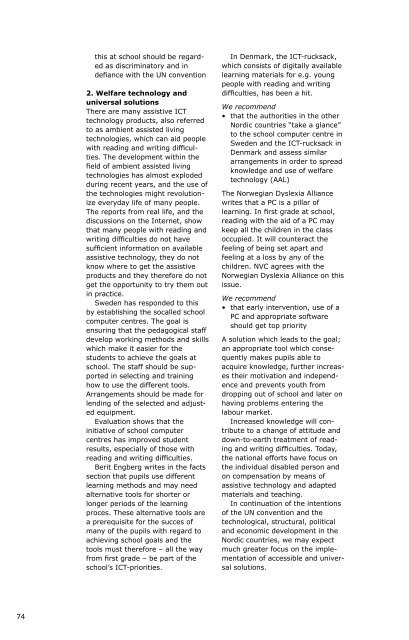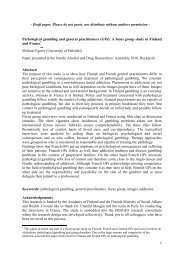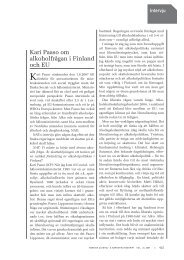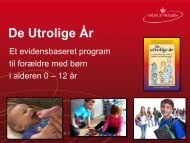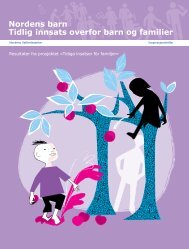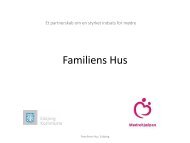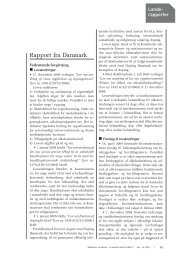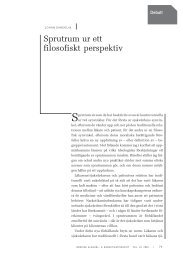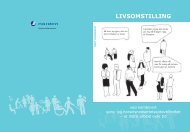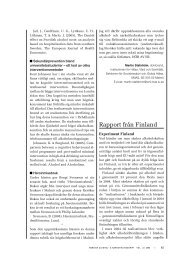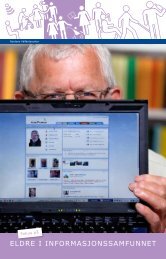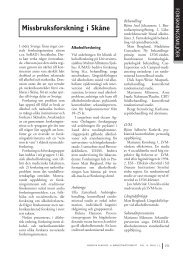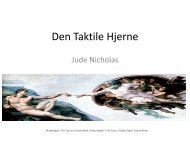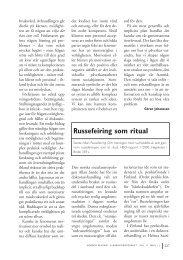L E S E - O G S K R I V E V A N S K E R - Nordens Välfärdscenter
L E S E - O G S K R I V E V A N S K E R - Nordens Välfärdscenter
L E S E - O G S K R I V E V A N S K E R - Nordens Välfärdscenter
Create successful ePaper yourself
Turn your PDF publications into a flip-book with our unique Google optimized e-Paper software.
this at school should be regardedas discriminatory and indefiance with the UN convention2. Welfare technology anduniversal solutionsThere are many assistive ICTtechnology products, also referredto as ambient assisted livingtechnologies, which can aid peoplewith reading and writing difficulties.The development within thefield of ambient assisted livingtechnologies has almost explodedduring recent years, and the use ofthe technologies might revolutionizeeveryday life of many people.The reports from real life, and thediscussions on the Internet, showthat many people with reading andwriting difficulties do not havesufficient information on availableassistive technology, they do notknow where to get the assistiveproducts and they therefore do notget the opportunity to try them outin practice.Sweden has responded to thisby establishing the socalled schoolcomputer centres. The goal isensuring that the pedagogical staffdevelop working methods and skillswhich make it easier for thestudents to achieve the goals atschool. The staff should be supportedin selecting and traininghow to use the different tools.Arrangements should be made forlending of the selected and adjustedequipment.Evaluation shows that theinitiative of school computercentres has improved studentresults, especially of those withreading and writing difficulties.Berit Engberg writes in the factssection that pupils use differentlearning methods and may needalternative tools for shorter orlonger periods of the learningproces. These alternative tools area prerequisite for the succes ofmany of the pupils with regard toachieving school goals and thetools must therefore – all the wayfrom first grade – be part of theschool’s ICT-priorities.In Denmark, the ICT-rucksack,which consists of digitally availablelearning materials for e.g. youngpeople with reading and writingdifficulties, has been a hit.We recommend• that the authorities in the otherNordic countries “take a glance”to the school computer centre inSweden and the ICT-rucksack inDenmark and assess similararrangements in order to spreadknowledge and use of welfaretechnology (AAL)The Norwegian Dyslexia Alliancewrites that a PC is a pillar oflearning. In first grade at school,reading with the aid of a PC maykeep all the children in the classoccupied. It will counteract thefeeling of being set apart andfeeling at a loss by any of thechildren. NVC agrees with theNorwegian Dyslexia Alliance on thisissue.We recommend• that early intervention, use of aPC and appropriate softwareshould get top priorityA solution which leads to the goal;an appropriate tool which consequentlymakes pupils able toacquire knowledge, further increasestheir motivation and independenceand prevents youth fromdropping out of school and later onhaving problems entering thelabour market.Increased knowledge will contributeto a change of attitude anddown-to-earth treatment of readingand writing difficulties. Today,the national efforts have focus onthe individual disabled person andon compensation by means ofassistive technology and adaptedmaterials and teaching.In continuation of the intentionsof the UN convention and thetechnological, structural, politicaland economic development in theNordic countries, we may expectmuch greater focus on the implementationof accessible and universalsolutions.74


